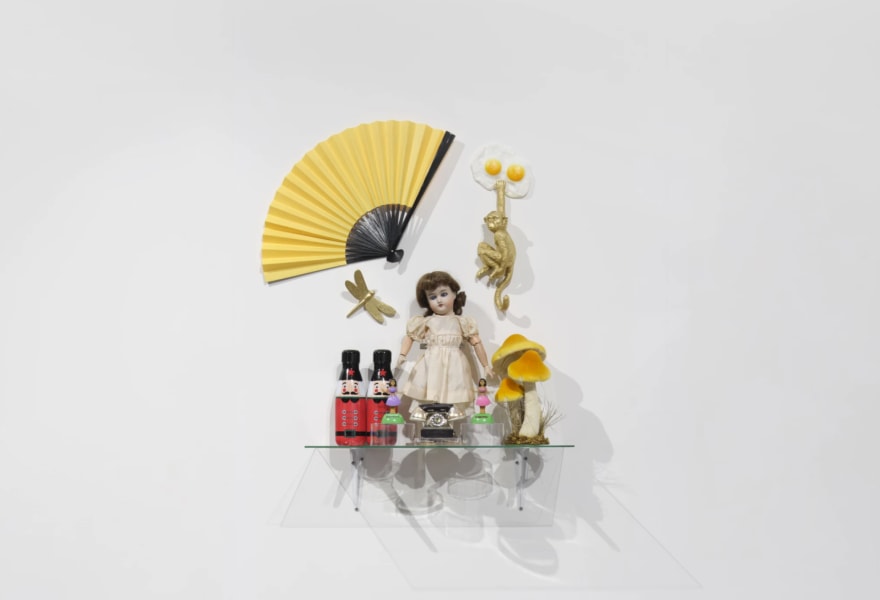28 may 2025, Emily Van Driessen
Guillaume Bijl’s Recent Sorrys
In his latest series of Sorry installations at Lumen Travo in Amsterdam, Guillaume Bijl (b. 1946, Antwerp) once again positions himself as the chronicler of our collective kitsch fantasies: the everyday absurdity of the West is carefully staged and lovingly mocked.
We’re greeted by flamingos on plastic grass, an androgynous knock-off of Michelangelo’s David flanked by a pineapple and a porcelain cat. A mannequin in fishnet stockings strikes a sultry pose among plastic miniature trees and mushrooms. At first glance, each element seems banal, over-the-top, perhaps even vulgar, but in Bijl’s hands, these objects become shrines to banality. Together, they might even be considered altarpieces of consumer culture.
Bijl is a master of walking the tightrope between critique and complicity. We laugh at the clichés, but we also recognise our own desires in them. Because, let’s be honest: who doesn’t secretly love a dancing hula girl wiggling her skirt?
And that other girl in red, under the glowing star, leaning against a folding screen as if presenting herself. It almost seems like a wink to the Red Light District. The gallery’s glass window only adds to the ambiguity. As you pass by, the woman appears to lure you inside.

Guillaume Bijl, Sorry, 2025, Lumen Travo Galerie
Since the 1980s, Guillaume Bijl has been making his so-called Sorry installations, works with titles like Sorry. A Fake Monument, Sorry. An Unimportant Performance, Sorry. A Tourist Information Stand. Each Sorry piece is a surreal, humorous assemblage of found objects. With the title of the series, Bijl offers a kind of pre-emptive apology for daring to make work that isn’t considered “serious” art. Every time, he presents something too banal, too frivolous, too honest for what typically qualifies as “high” culture. What began as a playful diversion from his more realistic Transformation Installations, meticulously built replicas of driving schools, mattress shops and other mundane interiors, has grown into a catalogue of our shared desires, embarrassments, and aesthetic repressions.
Bijl works with objets trouvés: everyday objects removed from their original context and reassembled. Recognisable bits of decorative kitsch: a toy telephone, a porcelain doll, a mushroom, a golden monkey hanging from two fried eggs. He brings them together with precision, dressing the sterile white gallery cube in colour and kitsch.
These days, “sorry” rarely sounds like a real apology. It’s striking how far the word has drifted from its original meaning. We no longer say it because we’ve done something wrong, but because we might be inconveniencing someone. Because we’re ashamed of taking up space, or of liking something a bit odd, or of asking a question, or simply for being present. Sorry to bother you. Sorry to say something. Sorry for standing here. It’s become a kind of social lubricant, a word we throw in to ease discomfort, to seem polite, to appear more palatable, or simply out of habit. Sorry is a placeholder that pretends to fix something, but doesn't.

Guillaume Bijl, Sorry, 2025, Lumen Travo Galerie
Bijl’s installations apologise in advance for their own existence: sorry I’m kitsch, sorry I’m too much, sorry I’ve put something on a pedestal that no one dares admit they like. It’s an ironic gesture, but not a cynical one. Secretly, we all find something in these constellations to be exciting, funny, or downright cute. His work reminds us that “bad taste” is part of being human, and thus inseparable from culture itself.
Guillaume Bijl is a man of the people, someone who mingles with the crowd. In Antwerp, he knows every second-hand shop and happily browses through wig stores where people greet him by name. His search for objects is almost a form of social fieldwork. Bijl is curious, charming, and physically engaging when he speaks, listening with an open and generous gaze.
We already take ourselves far too seriously. And when we don’t, we say sorry. Perhaps it’s time to let that go for a moment, and surrender to Bijl’s latest Sorry parade: a procession of wigs, plastic and porcelain. Joyfully unhinged and full of pleasure, he presents life as it is.
The exhibition ‘Recente Sorry’s will be on view at Lumen Travo in Amsterdam until 12 July 2025.
